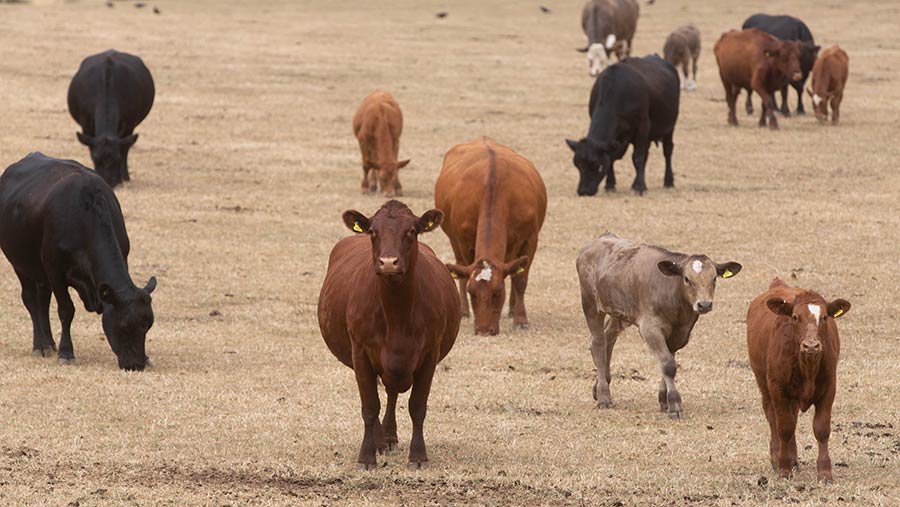Q&A: What is heat stress and how does it affect cows?
 © Tim Scrivener
© Tim Scrivener Hot, dry summers are becoming more common in the UK and this is making cattle fertility more challenging and leaving animals vulnerable to heat stress.
Ricardo Borralheiro, vet at Westpoint Farm Vets York, explains what heat stress is, outlines the symptoms to look out for, and explains what prompt action should be taken to reduce the effects of heat stress on animals and protect fertility.
See also: Strategies to prevent heat stress in cattle
What is heat stress?
Heat stress occurs when animals cannot lose extra heat through the normal physiological pathways (sweating and respiratory evaporation).
Ruminants have well-developed mechanisms of thermoregulation, but their core temperature can’t be maintained when exposed to excessive air temperature, solar radiation, wind and relative humidity.
See also: Strategies to prevent heat stress in cattle
What are the common signs of heat stress?
The most common direct signs of heat stress in farm animals are:
- Increased sweating
- Increased respiratory rate (panting)
- Increased rectal temperature
- Behavioural alterations – crowding under shade, reduced feed intake, standing next to water
- Reduced fertility
- Reduced milk yield
- Animals stand instead of lying down.
In more extreme cases, if the animal can’t establish a balance between heat dissipation and thermoregulation the core temperature will rise and the animal will collapse and die. This might be more likely when the animal has concurrent health problems.
If an animal has heat stress, can it predispose it to other health issues?
Yes. Since appetite may well be affected, and physiological cooling mechanisms take energy, these animals can be at increased risk of negative energy balance.
That means ketosis can become more likely, and with it all the associated conditions of the lower-immunity animal. This might include retained foetal membranes, endometritis and mastitis. All of these problems together can cause a huge economic and welfare impact on the farm.
What should you do if an animal has heat stress?
Animals should be isolated with the provision of shade and cooling.
In hot climates, cows are often provided with misting systems to get a bit of moisture on to their backs. This is an ideal way to assist their evaporative cooling and a make-shift system could be put together in the short-term for animals at risk in the UK.
Cooling needs to be done urgently, but carefully.
Substantial air movement must be provided within sheds, otherwise water misters can actually exacerbate heat build-up by depositing water on to the coat of animals and increasing insulation.
Therefore, a water-cooling system in a closed shed needs to create a very fine mist to prevent accumulation of water on the ground and beds. The fine mist particles stay suspended in the air and evaporate before being deposited on the ground, cooling the surrounding air.
It is also important not to suddenly shock a distressed animal, as could happen if doused with cold water. The key things are to get the animal out of the sun and provide water for drinking.
In severe cases a vet should be contacted.
If the animals are indoors:
- Check the ventilation (particularly on mild, still days).
- Do not overstock sheds.
- Always have fresh, clean water available.
- Only move animals during the cooler part of the day (early morning and late evening).
- Maintain good drainage, as humidity can exacerbate heat stress.
If they are outdoors:
- Provide shade. This is not always easy, but should be considered essential.
- Provide fresh, clean water close enough to avoid animals needing to walk great distances. Also, avoid the use of natural watercourses, as these may not be as reliable in drought conditions. They might also be a risk for the spread of infectious disease and parasites such as fluke.
- Provide palatable high-energy food, because grass is not very nutritious in these weather conditions.
Can anything be done to prevent a decrease in fertility?
The main thing is to prevent the animals experiencing extreme temperatures and humidity. When that is not possible, heat stress can reduce the quality of sperm and egg.
Further to this, ovulation time is usually delayed under heat stress conditions in relation to initiation of oestrus, so cows are in many cases artificially inseminated too early in relation to time of ovulation, leading to a lower conception rate.
The mechanism leading to the delayed ovulation is unknown. Talk with you vet about heat stress and the use of a gonadotropin-releasing hormone associated with AI to optimise ovulation.
